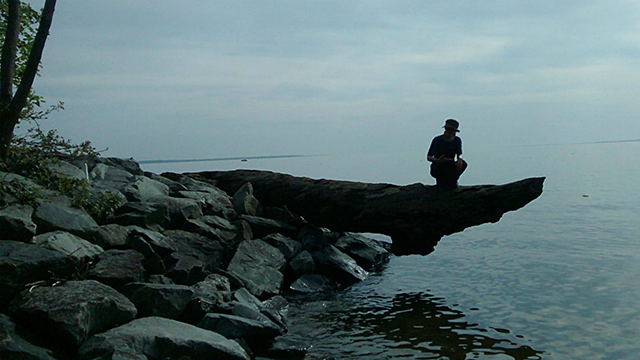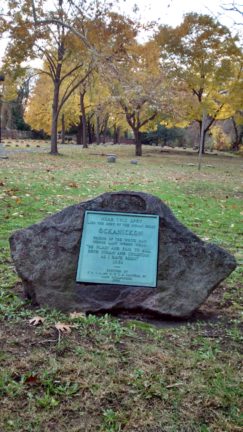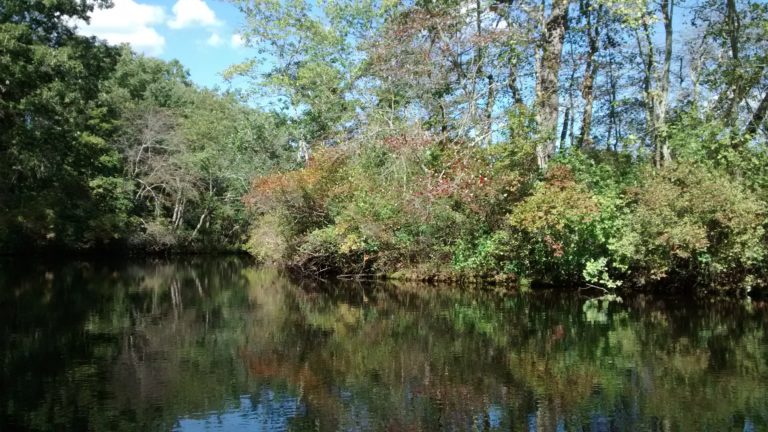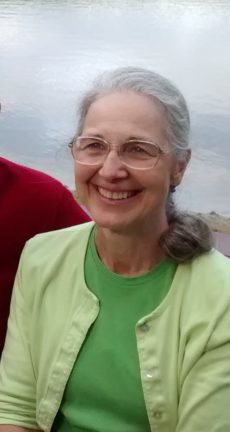
It has become PYM’s practice to begin Annual and Continuing Sessions—as well as plenary spaces, or sessions/spaces where we gather as a yearly meeting community/body—with a land acknowledgement. During this virtual Annual Sessions, we have extended that commitment over the runway of events to Sessions by offering a different land acknowledgement prayer before each Plenary and meeting for Business.
PYM asks the contact representative of the First Contact Reconciliation Collaborative, S. Boone O’ Scheyichbi to lead us in this prayerful acknowledgment of Lenapehoking, the ancestral-contemporary homeland of the Lenni-Lenape. An interview with Boone follows:
What is a Land Acknowledgment and why is it important to us as Friends?
Land acknowledgements are many things to many people. For me, it’s not a matter of picking up one of the guiding land acknowledgement manuals, it’s about words coming from a place of honoring spirit and responding to the divine. We are trying to come together and bring ourselves “home”; we’re honoring creator’s vision for each of us, and how do we carry that inner light forward.
Our visions become a prayer – we always give glory to the creator.
We may ask for guidance; and it’s always a joy. Even when holding a sorrow we just haven’t come to know and most fully understand.
How did you first become connected with the Lenni-Lenape?
Starting earliest within my heart, and then from experiences in New Jersey because we’ve always known the Lenape as the “original People” and immigrated indigenous peoples of New Jersey. We brought the concern into my monthly meeting and directly to Quarterly.
Friends there knew that it would be right to honor the original relationship between Friends and the Lenape, and Salem Quarter approved formation of an Indian Affairs Committee as a path to connect and engage with Nanticoke Lenni-Lenape Nation neighbors.
Tell us about the PYM Collaborative you’re engaged with.
We needed at Yearly Meeting to have something more than existed at that time, and the First Contact Reconciliation Collaborative (FCRC) came out that yearning.
As a group we talk about our experiences with indigenous people. We assemble resources, convene educational experiences (such as watching indigenous documentaries), reeducate ourselves, and intentionally build relationship by “showing up” when invited by Lenape to events or become aware of indigenous speaking engagements. We come together for healing sessions; we lift one another up; it’s a unique, fragile yet trusting space that nurtures the soul. We seek the authentic voices of indigenous peoples.

It is good to have an understanding of all Indian Country. To know what’s been inflicted on Indian Country, so we have an informed heart that helps us better understand what’s right here in front of us.
We are called to action from listening to Tribal Nations’ leadership. The action may be addressing the dominant governance (New Jersey), or collaboratively supporting work being done in local schools (currently in New Jersey, Delaware, and Pennsylvania). For example—confronting School Districts on the use of their racist mascots, logos, or other imagery that perpetuate stereotypes.
We have faithful obligation to work in all the PYM states – MD, DE, PA, NJ – reaching out to all levels of bureaucracy—from state leadership to local community—on issues of law or policy. We work to dismantle the walls of dismissive cultural lifeways, by leaning into inclusion and equity, reconciling Lenape and Friends’ earliest promises of relationship.
What is different about the Native American approach to life?
From dominant cultural lifeways, we are doing so much running around – doing this (or that) for our children – but this may not really be centered in the family/community. And may not be connecting to land or spirit. In dominant society we think of personhood first. Personhood then family – family then community in a linear style.
The Lenape are seasonal people. Lenape families have lived together in a faithful cultural community including governance and belonging to a wider collective where the land grounds ed them uniting community being a tribal nation lived by experience with Creator, feeling the sphere of Spirituality, communally, family, individually.

Each land acknowledgement relates to those different belief systems, both centered in spirit. The spirit then creates a response, and that response reflects where we might be in community, particularly open to a place without “blocks/stops.”
Tell us about your sense of home and your own sense of place.
As a child, we lived in the bubble of the Pine Barrens, the Great Egg Harbor is “my” river. I know the mud, the tidal water, when the brackish water comes, and when the salt leaves. Where the clay rests.
The relationship centers in knowing when and where it’s safe to play in the river, and when it’s not. Depending on absolute interconnectedness with “Scheyichbi” (which means South Jersey). Crying when leaving, rejoicing when returning; organically open to thriving, when physically or mentally finding oneself home.
Anything else?
Rachel Davis DuBois teaches us, like others right…, that there will surely be more; more to be sensed toward being Spirit-filled.
We are well aware that the Nanticoke Lenni-Lenape People are spiritual, giving thanks to Creator for each blessing, and in community live into all that is possible, beyond fears; this is where one finds the greatest of teachers and one’s blessing – being ascribed “extended family.”
 We are deeply aware of one’s “home,” where we “invest” our life, where we are called into belonging. That is the joy being hoped and prayed. We are humbled while having this conversation and will remember your kindness.
We are deeply aware of one’s “home,” where we “invest” our life, where we are called into belonging. That is the joy being hoped and prayed. We are humbled while having this conversation and will remember your kindness.
Thank you, Friend Boone!
Below is S. Boone O’ Scheyichbi’s land acknowledgement at the start of PYM’s Addressing Racism plenary held on Saturday July 25. We present it in writing with permission from Boone.
Land Acknowledgement from expectant worship preceding the Addressing Racism virtual plenary session…Self-centering – closing eyes, standing with open shoulders, body reaching upward, grounding soles/ soul…
Glory, glory be the drums beating, to the light of blessings, awakening from slumber our deeds of accountability with the divine…Spirit hold us bound one with another by opening our minds-ears to listening expectantly to voices that rise up….Help us stand up, open to New Beginnings….
With Mercy, guiding courageous promise of unity through binding our hearts love, dismantling domination one over another, Spirit navigate your children away from passively dismissing and actively accosting…toward paths of reconciling and healing acts of assault against your will, forgive us.
Humbly, we acknowledge the traditional territory of the Lenni-Lenape People, a vast land supporting the Philadelphia Yearly Meeting region. Honorably, the Lenni-Lenape People have lived in harmony on their homeland more than 15,000 thousand years.
Despite hospitable welcome and treaties of peace, dominant governance forced many Lenni-Lenape Tribal Nations from this homeland; although, some tribal communities have remained; blessed by diversity and in relationship with Friends, still here are Lenni-Lenape Tribal Nations: The Ramapough Lenape, Powhatan Renape, Nanticoke Lenni-Lenape, and Lenape Indian Tribe of Delaware.
We recognize the Lenni-Lenape as the “original people” of this land who bear the Creator’s “original instructions” in relationship with their land. By acknowledging the continued presence of Lenni-Lenape People of their homeland, we reaffirm the intentions treatied between Lenni-Lenape Chiefs and Friends toward mutual acts of perpetual peace and friendship, as long as that of the Creator endures.
May the Circle Be Unbroken. Na ne lekech (Lenape,) Let it be so
All Photographs courtesy of Boone